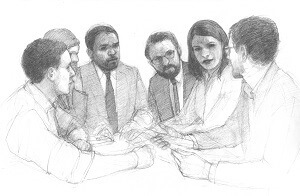Great Teams Hold Each Other Accountable
Are you just “going along to get along,” or are you committed to doing the work of an effective team?
Whether it’s a management team, work group, or nonprofit board of directors, accountability is one of the most critical—and difficult—aspects of team dynamics.
Wake-up calls around systemic racism, gender-based exploitation in the workplace, and the role of the philanthropic sector in perpetuating inequities has created an environment in which we are challenged to be more demanding of ourselves, our colleagues, and our organizations. At the same time, we hear that we’re really bad about giving and receiving feedback. The writing’s on the wall: We’d better learn to do accountability skillfully.
On paper, we make commitments to one another all the time. Boards are responsible for ethical and legal compliance of the organizations they serve. Teams align their work plans to achieve certain results. We all participate in creating the organization culture with how we show up to do our work every day.
But how often do we gracefully step in to remind one another when we are not living up to the performance standards of the team? Instead, do we give ourselves a pass because “we’re all talented people,” we don’t want to invite conflict, or we don’t think we have the time to have difficult conversations?
For many of us, we don’t want to rock the boat or distract from the mission—but if a more just world is the foundation of a lot of our nonprofit missions, it has got to start within our teams, interactions, and institutions.
Are you just “going along to get along,” or are you committed to doing the work of being an effective team?
For years, we have thought highly of and often use the framework offered by Patrick Lencioni’s Five Dysfunctions of a Team, which draws our attention to how Trust, Conflict, Commitment, Attention to Results, and—yes—Accountability are hallmarks of well-functioning teams. In the experience of Lencioni’s The Table Group consultancy, teams assessing their performance typically score themselves lowest on accountability.
How do we turn this around? We all have a role to play, regardless of where we sit in our organization.
- Leaders must model accountability. They are not the only ones responsible for holding others to their commitments—but if they are not observed doing so, no one else will hold one another accountable either.
- Management teams have a special role to play in helping to foster a culture of accountability. Like leaders, they must demonstrate what skillful accountability looks like and support effective peer-to-peer accountability.
- Other staff members should feel both empowered and responsible for the organization’s shared successes or failures. This means that as individuals we must both hold ourselves accountable and invite others to hold us accountable; it also means being willing to do the same for them.
After all: What is a team? A group of people who are working towards a common goal and actively holding each other accountable.


Comment section